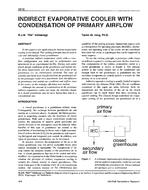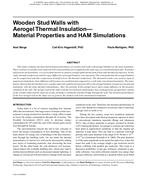Infrared thermography has been used successfully for many years to find problem areas on buried district heating systems. While such information is useful for locating areas of major failures, for planning purposes some quantification of the results from an infrared survey of major portions of a district heating system would be advantageous. Some recent progress has been made toward this end by two International Energy Agency (IEA) District Heating projects in which the U.S. Army Cold Regions Research and Engineering Laboratory (CRREL) has participated with colleagues from the Nordic counties. The objective of these projects was to develop a method that would allow quantification of heat losses from the temperature profile of the ground’s surface above the buried heat distribution pipeline. Basically, the method uses the integral of the temperature distribution at the ground’s surface along with climatological and system data to arrive at an empirical estimate of the heat loss. Using this method, CRREL has conducted infrared surveys of two facilities. Results have been good, and the facilities have been provided with both heat loss estimates and prioritized replacement lists. This paper describes the “TX method,” as it is called, and its use. Sample results from the surveys done to date will also be presented.
Units: SI
Citation: Symposium, ASHRAE Transactions, vol. 105, pt. 2, Seattle 1999
Product Details
- Published:
- 1999
- Number of Pages:
- 6
- File Size:
- 1 file , 290 KB
- Product Code(s):
- D-7434


